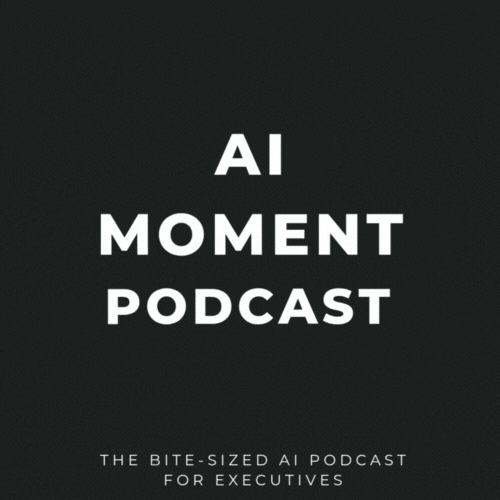WTAF Is Product Marketing Today & Why PMMs Are Vital In The Future
Marketing Unfiltered 43 - 25 Powerful Takeaways For CMOs On Product Marketing
📝 AUGUST 22nd | EDITORS NOTE 📝
Welcome Back, Marketing Leaders ☕️!
This week, we have another podcast edition of MU.
I promised you a PMM interview, and Rory did not disappoint. There are 25 takeaways below, but I highly encourage you to listen to the full podcast for the full nuggets shared.
Thanks for those who completed the 4-minute survey on how Marketing will look in 2030 for a £25 Amazon voucher.
Enjoy your weekend!
Danny Denhard - ( 👋 wanna connect - email or LinkedIn)
THIS WEEK’S MU IS BROUGHT TO YOU BY 🎧 THE AI MOMENT PODCAST 🎧
Are you or your colleagues struggling with AI?
How about an 8-minute podcast twice a week to help you understand AI, the ongoing tech shifts, and the real implications, while enabling you to cut through all the noise.
» Listen to the most popular pod so far here
HOW THE FUTURE OF PRODUCT MARKETING WILL SHAPE MANY BUSINESSES’ SUCCESS
THE FUTURE OF PRODUCT SUCCESS MIGHT JUST RELY ON GREAT PMM’S
I had a brilliant and candid conversation with Product Marketing Consultant Rory Woodbridge. Click to watch below
Rory joined me to demystify Product Marketing and explore its growing strategic weight in European tech.
Rory spent his formative years at Google, YouTube and Monzo before founding The Product Marketer. Rory argues that product marketing's core purpose is to create product “message clarity”: a shared language that bridges product, engineering, sales and brand so the customer always hears one coherent story.
Although the PMM function is two decades old in the US, he says it is only in the last five to ten years that UK and European firms have begun recruiting dedicated PMM teams, and it’s still very much maturing.
Connect with Rory:
His Site - theproductmarketer.co // his newsletter https://productmarketer.substack.com/
LinkedIn - https://www.linkedin.com/in/rorywoodbridge/
Contact - https://theproductmarketer.co/contact
Short On Time? Here’s The Pod Broken Down:
Why PMM Still Needs Explaining
CMOs and founders routinely confuse product marketing with product management, growth or comms.
Rory warns that because every firm defines the remit differently, the discipline can seem shape-shifting.
In early-stage companies, a PMM is a multi-hat role that might fill research gaps; in better-resourced scale-ups, they concentrate on GTM, the right positioning and enablement.
The biggest danger, rightly points out, is allowing the role to become an organisational dumping-ground for stray copywriting, CRM or project-management tasks that dilute strategic impact.
Reporting Lines and Political Tightropes
Asked where PMM should sit, Rory gives the pragmatic answer: with whichever C-suite leader gets it and will champion the work.
In Europe, that is usually the CMO; in some product-led cultures, the CPO makes more sense.
A temporary spell reporting directly to the CEO can accelerate cross-functional buy-in, but long-term, the team must avoid being perceived as an arm of one tribe.
I have often found that (O)KR-heavy organisations often push PMM towards Marketing to stay aligned with revenue metrics; Rory has seen the healthiest set-ups let PMM pivot freely to the business's biggest growth constraint, whether that is adoption, messaging or launch orchestration.
State of Play in 2025 & 2026
Looking ahead, Rory predicts smaller, more specialised PMM teams with big expectations will become the norm.
Europe's ecosystem will likely never mirror Silicon Valley's, but demand for fractional or consultancy support is surging as AI start-ups seek senior expertise they cannot afford full-time.
He expects AI to remove PMM drudgery, ”meeting notes, first-draft copy, desk research,” freeing practitioners to tackle higher-order work such as new-market analysis and full-company narrative design.
However, saturation looms: low-code tools mean anyone who can imagine an app can now build 80% of one, so differentiation will hinge on sharper positioning and distribution.
What Does A Good PMM Look Like
For leaders wondering how to judge PMM output, Rory offers one yardstick: clarity.
When the website, sales deck and product roadmap tell the same story, and internal grumbles between product, sales, and brand subside,” you know PMM is working.
I love that Rory champions radical simplicity, relentlessly stripping features, copy and decks to the essentials customers actually value.
The trio of high-value deliverables he is most often hired for are:
Rigorous customer segmentation rooted in TAM, ICP and personas
A structured positioning process ”blending classic methodologies with April Dunford's framework” to force hard strategic trade-offs; and
Launch storytelling that is both exciting and empirically grounded.
Implications for CMOs
For CMOs and Marketing leaders, the message is clear. First, treat PMM as a full-funnel discipline that owns insight, narrative and commercial alignment, not just launch emails.
Second, guard the team from scope-creep busywork that AI or other functions can absorb.
Third, invest in senior principal PMMs or super-ICs (I call them experts) who can influence across squads without chasing management titles.
Finally, recognise that in an AI-levelled world of instant feature parity, brand trust and product-message clarity will be your lasting moat, so give product marketing the mandate, resources and C-suite airtime to build it.
My Top 25 Takeaways For CMOs & Marketing Leaders
» Strategic Foundation 🧱
Product marketing is "a strategic function that finds common language between product/tech teams and commercial/sales teams" - the bridge that prevents organisational silos
Founders are the original product marketers - they naturally do customer research, positioning, competitive analysis, and storytelling in early stages
PMM should report to whoever understands it best in the C-suite - success depends on leadership buy-in rather than organisational placement
Product marketing works best as a "shape-shifting role" that fills gaps where the business needs the most impact
The function has matured from a recruitment burst in 2021 to more sophisticated, understood teams with bigger expectations
» The AI Revolution Impact 🤖
AI will free up 20+ hours per week by automating email marketing, website copy, meeting notes, and administrative tasks
"When AI enables anyone to one-click copy their competitor, differentiation through superior marketing becomes the competitive advantage"
Product categories will become saturated quickly as tools like Lovable enable anyone to build 80% of an app rapidly
Winners will be those who master marketing and distribution rather than just product features
PMMs will play crucial roles in making AI accessible to mainstream consumers who feel "overwhelmed" by infinite possibilities
» Operational Excellence 👩💼
"Radical simplicity" is a superpower - constantly push for the shortest way to communicate value
Customer understanding should be structured like Russian dolls - TAM → segmentation → ICP → personas, not rushing to personas
Positioning is an intentional process, not a Tuesday afternoon whiteboard session requiring deep customer, competition, and market analysis
Great PMMs bring "clarity across all customer touchpoints" - website matches sales deck matches social messaging
Success metric: reduced internal friction - less rumbling between sales, product, and marketing teams
» Team Structure & Evolution 🔮
Rise of the "principal product marketer" - senior ICs who want high impact without management responsibilities
Product marketing should be full-funnel - top of funnel through retention and referrals, not just launches
Best PMMs can move between marketing and product reporting seamlessly without business disruption
“The European PMM scene is ~10 years behind the US” but is developing distinct characteristics due to regulatory and cultural differences
Consultancy model growing in Europe as many companies need PMM expertise seasonally rather than full-time
» Competitive Advantages 💪
"Embrace that naive, ignorant brain before getting infected by inside thinking" - maintain customer perspective
Customer reviews are "gold" but consistently overlooked - especially good reviews for messaging insights
The biggest challenge: scope creep - PMMs filling gaps in CRM, website copy, project management instead of strategic work
Performance marketing's dominance creates short-termism that reduces creative, long-term differentiation
Smaller companies (50-500 people) offer better PMM opportunities than large enterprises for full company impact
Don’t forget to connect with Rory
Connect with Rory:
Via his Site - theproductmarketer.co // sub on his newsletter https://productmarketer.substack.com/
LinkedIn - https://www.linkedin.com/in/rorywoodbridge/
Contact - https://theproductmarketer.co/contact
Thanks for reading today, and if you’d like to discuss this or any other newsletter, drop me a DM on LinkedIn or just hit reply to any email.
Danny Denhard
» If you need help: I coach leaders, consult with startups and challenger brands and advise companies looking to grow, so get in touch
6 Takeaways From Last Week’s MU Article
Here are the top 6 takeaways from last week’s newsletter by Harry
The American Eagle campaign with Sydney Sweeney sparked intense debate, swinging between viral success and accusations of far-right messaging.
Modern marketing thrives on controversy and velocity, making mistakes and backlash almost inevitable in today’s media landscape.
The ad’s messaging (“good genes”) was misinterpreted by some as promoting eugenics, fueling outrage, while others saw it as a harmless celebrity endorsement.
A deleted video from the campaign added fuel to the controversy, with critics claiming it hinted at problematic themes, while supporters dismissed concerns.
The campaign’s divisiveness highlights how brands now seek fame through polarising content, accepting reputational risk for attention and sales.
Ultimately, scandals fade quickly in the digital age, and brands risk irrelevance more than cancellation, pushing them to provoke and dominate headlines.
Read the full article: Did American Eagle Crash Land, Or Is It Flying High?
Thanks For Reading This Week ✅
Share To Your Favourite Marketing Group
→ 💬 Copy and paste https://www.marketingunfiltered.co/?modal=signup into your group chat of choice (hint: into your favourite Marketing WhatsApp group to help them learn each and every week)
Danny Denhard & Harry Lang






